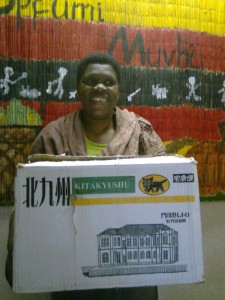Mugabe attacks West at sister’s burial
Monday, August 2nd, 2010 by Bev ClarkYour sister’s funeral – always a good time to rant and rave, and mention the word “hell” several times:
Zimbabwe’s Mugabe attacks West at sister’s burial
HARARE, Zimbabwe — Zimbabwe President Robert Mugabe said Sunday the death of his sister robbed him of one of his closest friends and allies in his lifelong fight against colonial era rule and Western dominance in Africa.
In an emotional and angry address at the state funeral of Sabina Mugabe, 80, President Mugabe attacked the West and said after his sister’s death Thursday he will not abandon their cause.
“To hell” with Europeans and Americans opposed to his rule, he said. “We say to hell, hell, hell with them. They will not decide who is going to lead the people of Zimbabwe.”
U.S. Ambassador Charles Ray left the funeral during Mugabe’s address, but later refused to comment on his action.
Sabina Mugabe retired from Parliament in 2008 after a lifetime in politics alongside Mugabe. She was buried at Heroes Acre, a national shrine for loyalist politicians and fallen guerrillas from the liberation war that ended white rule in Zimbabwe in 1980.
Mugabe on Sunday accused the West of imposing sanctions on his nation to force his ouster.
Since a power sharing deal formed a coalition government last year with Prime Minister Morgan Tsvangirai, the former opposition leader, Zimbabwe has campaigned for the lifting of travel, banking and business bans and other sanctions targeting Mugabe and some 200 of his party leaders and associates.
Mugabe blames Western sanctions for the nation’s economic meltdown. Critics say the often violent seizures of thousands of white-owned commercial farms Mugabe ordered since 2000 disrupted the agriculture-based economy in the former regional breadbasket that now needs food aid.
Mugabe said a “European-American clique” imposed sanctions for their own reasons.
“Europe and America want to keep these odious sanctions. They are now saying Mugabe must go first, and they choose someone to lead the country,” he said.
Sabina Mugabe was among those barred from Western countries. Western governments argue Mugabe has not done enough to honor the power sharing agreement to restore law and order and bring about sweeping democratic reforms.
Mugabe’s sister retired from active politics in 2005 after she suffered a stroke but she remained a constant force at Mugabe’s side and remained in Parliament.
The death Thursday of Robert Mugabe’s most trusted family confidante and associate is a severe blow to the ascetic 86-year-old president, who is often seen as having few close friends or trusted advisors.
- By CHENGETAI ZVAUYA (AP)










